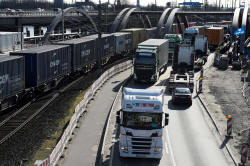Supply headaches sink German business morale to six-month low
 Send a link to a friend
Send a link to a friend
 [October 25, 2021] By
Michael Nienaber and Balazs Koranyi [October 25, 2021] By
Michael Nienaber and Balazs Koranyi
BERLIN/FRANKFURT (Reuters) -German business
morale deteriorated for the fourth month running in October as supply
bottlenecks in manufacturing, a spike in energy prices and rising
COVID-19 infections are slowing the pace of recovery in Europe's largest
economy from the pandemic.
The Ifo institute said on Monday that its business climate index fell to
97.7 from an upwardly revised 98.9 in September. This was the lowest
reading since April and undershot the 97.9 consensus forecast in a
Reuters poll.
The weaker-than-expected business sentiment survey was followed by a
grim outlook from Germany's central bank, which said in its monthly
report that economic growth was likely to slow sharply in the fourth
quarter.
The Bundesbank added that full-year growth was now likely to be
"significantly" below its 3.7% prediction made in June.
"Supply problems are giving businesses headaches," Ifo President Clemens
Fuest said, adding that capacity utilisation in manufacturing was
falling.
"Sand in the wheels of the German economy is hampering recovery."

Half of all industrial companies are planning to hike prices due to the
continuing supply problems, which is a record high in the survey, Ifo
economist Klaus Wohlrabe said.
The bottlenecks for intermediate goods and raw materials are spilling
over from manufacturing to other sectors of the economy too, such as
retailing, meaning not every Christmas present will be available for
delivery in time, Wohlrabe added.
The supply problems would slow down growth to roughly 0.5% in the fourth
quarter, Wohlrabe said.
The German economy expanded by 1.6% quarter-on-quarter in the three
months from April to June.
[to top of second column] |

Containers are transported to loading terminals in the port in
Hamburg, Germany March 11, 2020. REUTERS/Fabian Bimmer

The Federal Statistics Office will publish a flash estimate for GDP growth in
the third quarter on Friday. Analysts predict a quarterly expansion of 2.2% from
July to September.
The government on Wednesday is likely to slash its forecast for economic growth
this year, after leading institutes cut their joint forecast to 2.4% from 3.7%
last week. For 2022, the institutes predict 4.8% growth.
"The coronavirus crisis has turned into a scarcity crisis," VP Bank economist
Thomas Gitzel said.
In addition to the supply problems, the spike in gas and energy prices is
complicating the recovery, Gitzel added.
Other analysts pointed to rising COVID-19 infections in Germany, which could
lead to renewed restrictions for retailers, bars and restaurants over the winter
months.
Commerzbank economist Joerg Kraemer said companies were expecting politicians to
react to the latest increase in coronavirus infections with new restrictions.
In addition, the current coronavirus wave is leading to factory closures,
especially in Asia, which will exacerbate the material shortages in Germany,
Kraemer added.
"The German economy is unlikely to grow much in the fourth quarter. Stagflation
is on the horizon for this quarter at least," he said.
(Reporting by Michael Nienaber; Editing by Riham Alkousaa, Clarence Fernandez
and Hugh Lawson)
[© 2021 Thomson Reuters. All rights
reserved.] Copyright 2021 Reuters. All rights reserved. This material may not be published,
broadcast, rewritten or redistributed.
Thompson Reuters is solely responsible for this content.
 |